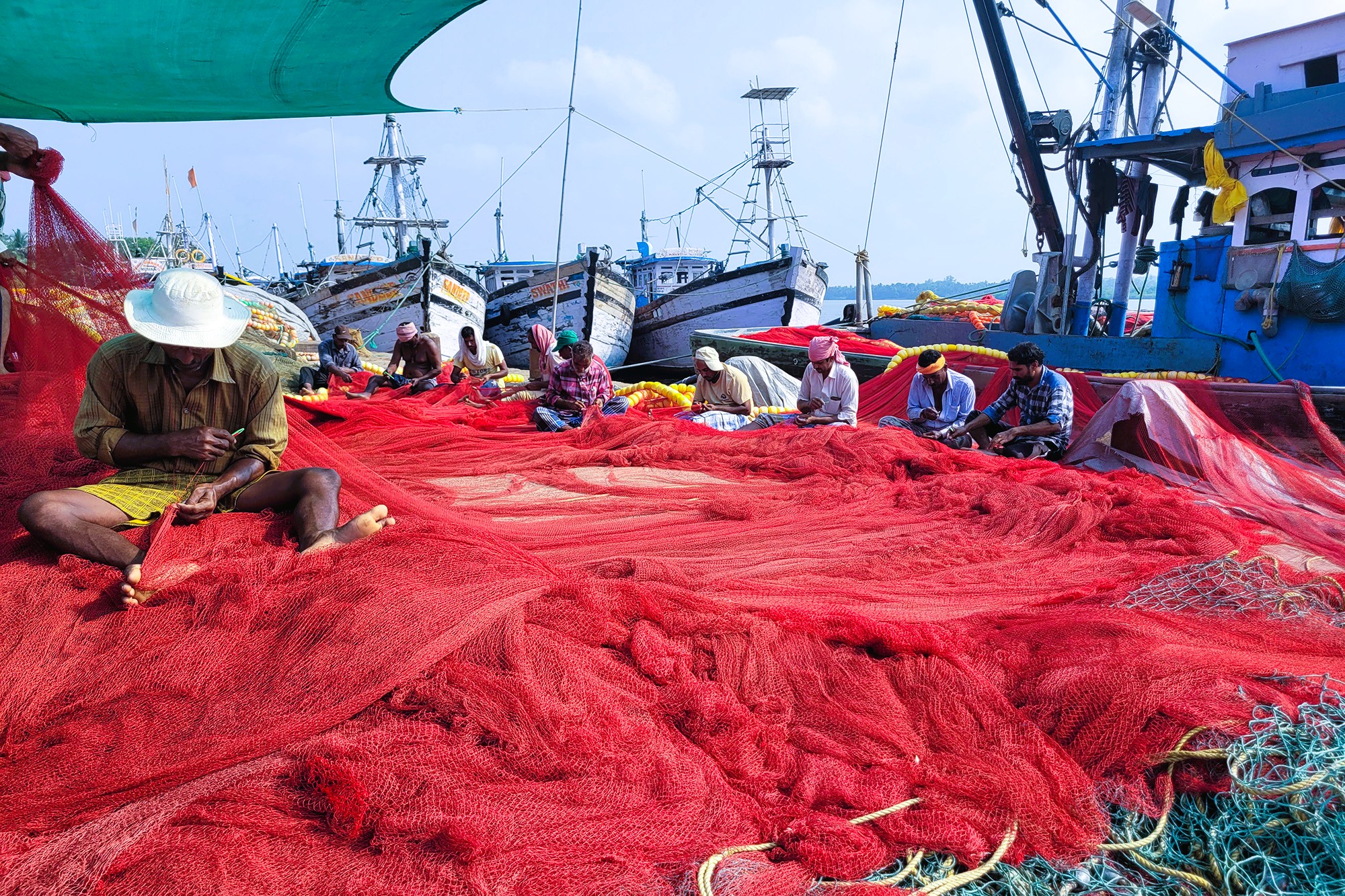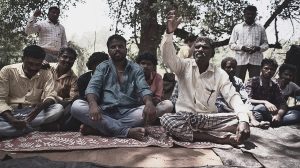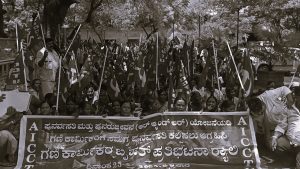The coastal town of Honnavar in Karnataka has erupted in protest against a private port project by Honnavar Ports Private Limited (HPPL), a subsidiary of GVPR Engineers Ltd., which has no experience in port construction. On February 24, 2025, thousands from the local fishing community staged a sit-in at Kasarkod beach. The peaceful protest was met with police brutality—over 100 were arrested, several attempted mass suicide, and one woman suffered a severe mental health crisis. The next day, police invoked Section 163 of the Bharatiya Nagrik Suraksha Sanhita (BNSS) to escort land survey officials.
Eighty-one houses were marked for demolition, and 24 protest leaders jailed for 24 days. In response, the entire fishing community struck work for a week.
Protests have simmered since 2012 but intensified recently due to rising state and corporate aggression. Both Congress and BJP have backed the port, despite earlier public opposition. Fisheries Minister Mankala S Vaidya, once a supporter of the movement, has now aligned with the government. Even the RSS, influential in the region, has remained silent.
Policy changes paved the way: port limits were redrawn in 2013, followed by the 2014 Karnataka Minor Ports Development Policy and the 2015 Maritime Board Act—enabling privatisation and infrastructure to export mineral ores. The HPPL port and a ₹200-crore highway connector—fully funded by the central government—are part of this agenda. Forest land has already been cleared. Over 6,000 families and 23,500 fisherfolk, many of them women, depend on fishing. The port threatens to wipe out local fish markets and displace around 60,000 people.
The Kasarkod fisherfolk community includes Persian boat owners, trawler owners, fresh and dry fish traders, petty fishers, boat workers, loaders and boxers. It is a class-divided society, yet during our fact-finding visit to Tonka village and Kasarkod fishing harbour with members of AICCTU, PUCL and Fridays for Future, we found the entire community united in opposing the port. All workers and traders we spoke to feared for their land and livelihood. They jointly struck work for a week to demand the release of 24 jailed comrades. Despite leaders coming from the business-owning class, workers and petty fishers stood united, went to jail with them, and faced police atrocities. Everyone sees clearly that this “development” will cost them their land and livelihoods. The entire population of Tonka 1 and Tonka 2 depends directly on fishing.
The fisherfolk community has not always been united like this. It has been achieved through the movement against the port. Raju Tandel, General Secretary of Karavali Meenugarara Karmikara Sangha, explains that earlier there was only one fishers’ organisation in the area—Karavali Meenugarara Sangha. Now, if a fishing boat catches fish worth Rs. 1 lakh, Rs. 58,000 goes to the boat owner, Rs. 35,000 to the workers and Rs. 7,000 to the boat manager. In 2009, the workers’ share was only 30%. After strikes and protests, this increased to 35%. Around that time, there were also communal tensions between Hindu and Muslim fisherfolk. All these factors led to the split of Karavali Meenugarara Sangha into 4 organisations—Karavali Meenugarara Karmikara Sangha, Persian Boat Malikara Sangha, Trawler Boat Malikara Sangha, and Hasi Meenu Vyaparastara Sangha. Now, against this port construction, all these organisations have united again under a joint banner—Meenugarara Horata Okkutta—with Rajesh Govind Tandel as President. All these organisations, led by boat owners or fish traders, are at the forefront of the movement. The police crackdown has further united the community. Communal divisions—long fostered by the RSS—have now healed. This unity offers a lesson for anti-fascist forces confronting Hindutva.
While the district administration and project officials claim livelihoods won’t be affected, the people disagree. To understand the stakes, we spoke to Prof. Ramachandra Bhatta, fisheries economist and President of Sneha Kunja Trust.
Prof. Bhatta warns that the proposed port threatens both livelihoods and ecology. Honnavar, located at the Sharavathi River estuary, lies within one of the world’s most productive ecosystems. Breakwaters planned on both sides of the port will block natural sediment flow, causing severe coastal erosion. Tonka and Kasarkod villages sit on fragile sandy land—once the sediment stops, the land may vanish.
The Sharavathi estuary also supports critical marine biodiversity and is a nesting site for endangered Olive Ridley turtles, protected under Indian law. Upstream damming has already altered salinity and reduced fish productivity. Compared to the undammed Aghanashini River, Sharavathi’s fish yields are four times lower.
Prof. Bhatta critiques the government’s push for privatised, export-oriented portsthat favour resource transport—coal and iron ore—over local survival. Fisheries policy now leans toward capital-intensive projects. Traditional fishers within 12 nautical miles using small boats still make most of the catch, but eceive little support. In contrast, large trawlers get lakhs in subsidies under schemes like Matsya Sampada.
In 2019, over 2,000 women lost their livelihoods when a 44-hectare dry fish processing area—built over decades—was handed to HPPL. They were excluded without compensation or alternatives.
Land rights are another crisis. Most settlements lie on “accrued” land formed by sand deposits, but remain unsurveyed and unrecognised. Many were already displaced by sea erosion in Mallukuruva and now face eviction again. Unlike Padubidri—where such land was surveyed and regularised—Kasarkod residents have been denied similar recognition.
Despite being a sandspit, home to mangroves and nesting turtles, courts have dismissed challenges to the port. The National Green Tribunal rejected a plea against the road project despite CRZ violations. HPPL was exempted from public hearings. A site visit by NCSCM in August was timed during the monsoon—outside nesting season—making the report a farce. “Everyone knows August is monsoon. They visited when turtles don’t nest, just to suit the port narrative.” said Prof. Bhatta.
Across India, port projects have harmed coastal communities. Mumbai’s Coastal Road Project halved fish catches, hitting women hardest. Kerala’s Vizhinjam Port damaged biodiversity. Odisha’s Dhamra Port displaced families. Maharashtra’s Vadhavan Port endangers 20,800 fisherfolk in 16 villages. Karwar Port expansion raises pollution concerns. Gujarat’s ports disrupted fish migration and increased pollution. These cases show a clear pattern: infrastructure that enriches corporates while marginalising fishing communities and deepening ecological insecurity.
The situation in Honnavar is not an isolated case, but a clear reflection of Karnataka’s broader port development policy—one designed to serve the interests of powerful mining and other big corporations under the guise of coastal development. Backed by the central government’s Sagarmala programme and state-level policies, ports are being rapidly constructed along the state’s 320-kilometre coastline, often through public-private partnership. Other than Honnavar, these include New Mangalore, Keni, Karwar, and Belekeri. The Honnavar port is being developed by HPPL, a subsidiary of mining company GVPR Engineers Ltd., explicitly to facilitate the export of iron ore and other minerals. Similarly, JSW, one of India’s biggest mining and steel conglomerates, is pushing port projects in Keni and Pavinkurve in Uttara Kannada, exposing the direct link between mining interests and port expansion. These developments are threatening coastal ecosystems, displacing traditional livelihoods, and repressing the voices of local communities. While speaking to the fact-finding team in Karwar, Vikas Tandel, an executive member of the National Fish Worker Forum, Karnataka said, “It’s not very far when we won’t be able to see these people fishing, singing and dancing on the coast. Their livelihoods, their culture, everything will be wiped away with this port spree.” Resistance is not limited to Honnavar—similar struggles are underway in Keni, Tadadi, and Karwar.
Due to this “development” model that enables corporate plunder of natural resources at the expense of the environment and people, land grab and displacement have become the biggest menace affecting the broad masses today. Since 1991, about 15 million farmers have moved out of agriculture, mainly because the system does not make farming (including pastoralism, fisheries, and forestry) remunerative enough. 60 million people have been physically displaced by dams, mining, expressways, ports, statues, industries—mostly with poor or no rehabilitation. Exploiting these people desperate for any kind of job as well as nature, an already wealthy minority becomes wealthier by the second. The richest 5% of Indians now earn as much as the remaining 95%. Be it Karwar, Tadadi, Keni, Nagarhole, Devanahalli, Bastar, Niyamgiri, Hasdeo, or countless other places, people are facing the carrot and stick policy of the Indian state. We see how courts dismiss legal petitions, how environment assessments give free passes to corporates, how mass arrests, and extra-judicial killings take place. Though militarisation varies across regions, the common thread is land grab and an attack on people’s lives and livelihoods. These attacks transcend states and ruling parties—BJP or Congress—making it a national project spearheaded by big corporates. In this, state governments, police, paramilitary forces, and judiciary have historically acted against people’s interests. This alliance is clearly playing out in Honnavar.
The Honnavar struggle is not just about a port—it represents a larger contradiction between the broad masses and domestic big capital backed by imperialism. The capitalist idea of development is profit for a few; it spells danger for people and nature. We must stand in solidarity with communities fighting this battle on the ground. We must unite and struggle to bring about an alternative, democratic model of development.
[The facts presented in this article are based on a fact-finding mission conducted by a team comprising members of the All India Central Council of Trade Unions (AICCTU), the People’s Union for Civil Liberties (PUCL), and Fridays for Future. A detailed report is set to be released.]



